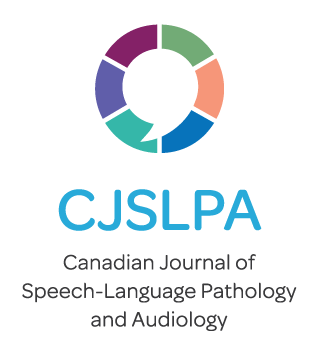

| Author(s) |
Josée Lagacé M. Kathleen Pichora-Fuller |
| Volume | 30 |
| Number | 2 |
| Year | 2006 |
| Page(s) | 110-131 |
| Language | English |
| Category | |
| Keywords |
Au D audiology education professional credential curriculum training |
| Abstract |
The purpose of this work is to establish a historical baseline to be used as a reference for evaluating change in the opinions of Canadian audiologists regarding training options for entry into the profession. In 2003, a landmark survey of Canadian audiologists was undertaken in order to gauge the degree of support for the professional Doctorate of Audiology (Au.D.) as the minimum credential required for entry into practice as an audiologist in Canada. Responses were received from 435 audiologists and audiology students, with the estimated response rate being about 35%. Information was gathered about the respondents, including their province, practice setting, training, years of education, age, salary, and memberships in associations. The profile of the respondents is described, followed by a report of their views on existing training options, and then by their views on options for improving the education of audiologists and on the Au.D.. The majority of respondents (about 85%) felt that the education of audiologists in Canada should be improved. However, the respondents were split as to how they thought improvements could best be achieved. Overall, about a third supported the Au.D. option and about half did not, with a fifth being undecided. There were no factors that seemed to distinguish the respondents who favoured the Au.D. option from those who did not. The question of whether or not to adopt the Au.D. is framed in the historical context of the development of the profession of audiology in Canada and related issues are explored. Finally, recommendations are made regarding the education for credentialing of Canadian audiologists in the short and long-term. Ce travail vise à établir un point de référence qui servira à évaluer l’évolution de l’opinion des audiologistes canadiens concernant les options de formation pour pratiquer la profession. En 2003, un sondage repère mené auprès des audiologistes canadiens a été réalisé pour évaluer le degré de soutien à un doctoral professionnel en audiologie (Au.D.) comme diplôme minimal pour exercer la profession d’audiologiste au Canada. Le taux de réponse du sondage est évalué à 35 %, soit 435 audiologistes et étudiants en audiologie. Des renseignements ont été recueillis au sujet des répondants, y compris leur province, leur milieu de pratique, leur formation, leurs années de scolarité, leur âge, leur salaire et leur adhésion à des associations. Le profil des répondants y est décrit, suivi d’un rapport sur leur point de vue concernant les options de formation actuelles, les façons d’améliorer l’éducation des audiologistes et le niveau du Au.D. La majorité des répondants (environ 85 %) était d’avis qu’il faut améliorer l’éducation des audiologistes au Canada. Toutefois, les répondants étaient divisés quant à la façon d’améliorer la situation. Dans l’ensemble, le tiers appuie le niveau du Au.D. et la moitié ne l’appuie pas; le cinquième des répondants sont indécis. Aucun facteur ne semble distinguer les répondants en faveur des autres. La question de l’adoption de ce niveau de formation s’inscrit dans le contexte historique de l’évolution de la profession au Canada et des questions afférentes. Enfin, des recommandations sont formulées pour l’établissement d’un titre pour les audiologistes du Canada à court et à long terme. |
| Record ID | 925 |
| Link | https://cjslpa.ca/files/2006_JSLPA_Vol_30/No_02_81-152/Pichora-Fuller_Lagace_JSLPA_2006.pdf |
CJSLPA is an open access journal which means that all articles are available on the Internet to all users immediately upon publication. Users are allowed to read, download, copy, distribute, print, search, or link to the full texts of the articles, or use them for any other lawful purpose.
CJSLPA does not charge authors publication or processing fees.
Copyright of the Canadian Journal of Speech-Language Pathology and Audiology is held by Speech-Language and Audiology Canada (SAC). Appropriate credit must be given (SAC, publication name, article title, volume number, issue number and page number[s]) but not in any way that suggests SAC endorses you or your use of the work. You may not use this work for commercial purposes. You may not alter, transform, or build upon this work.